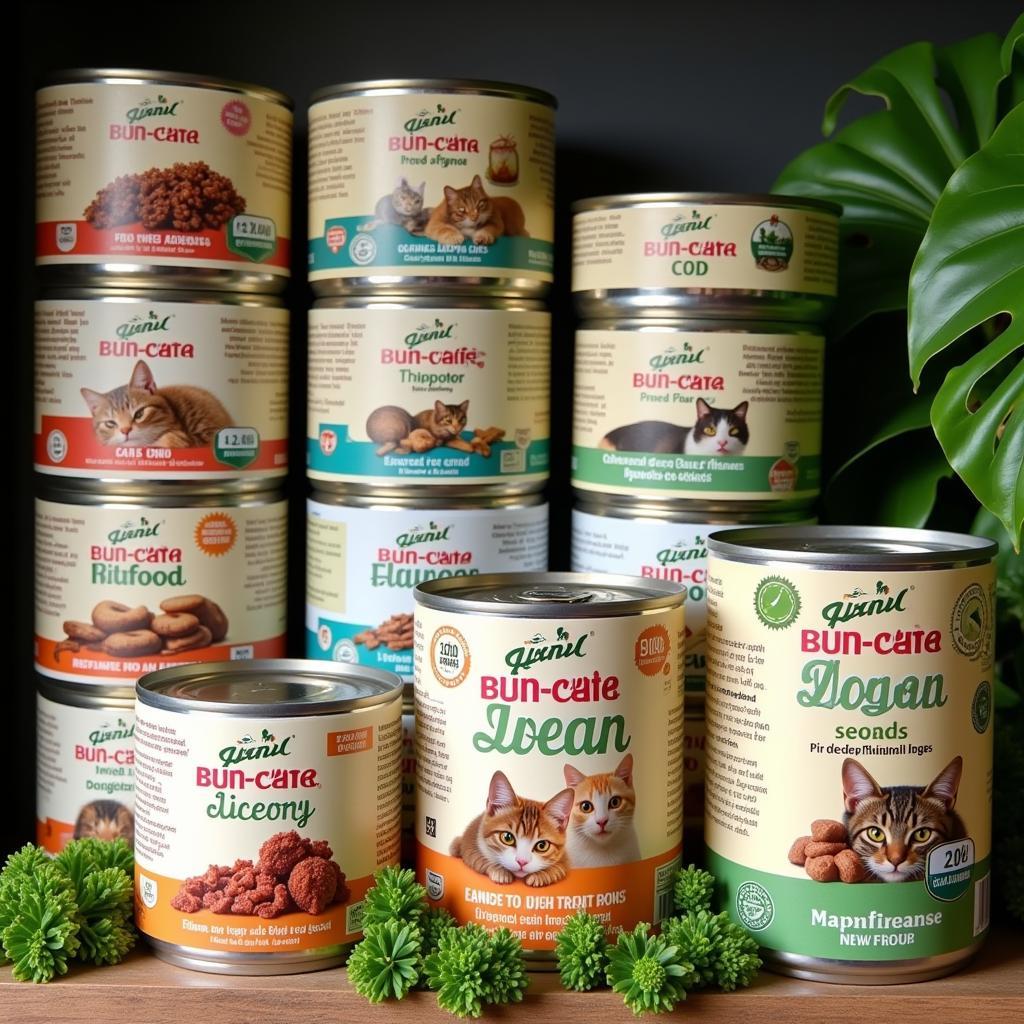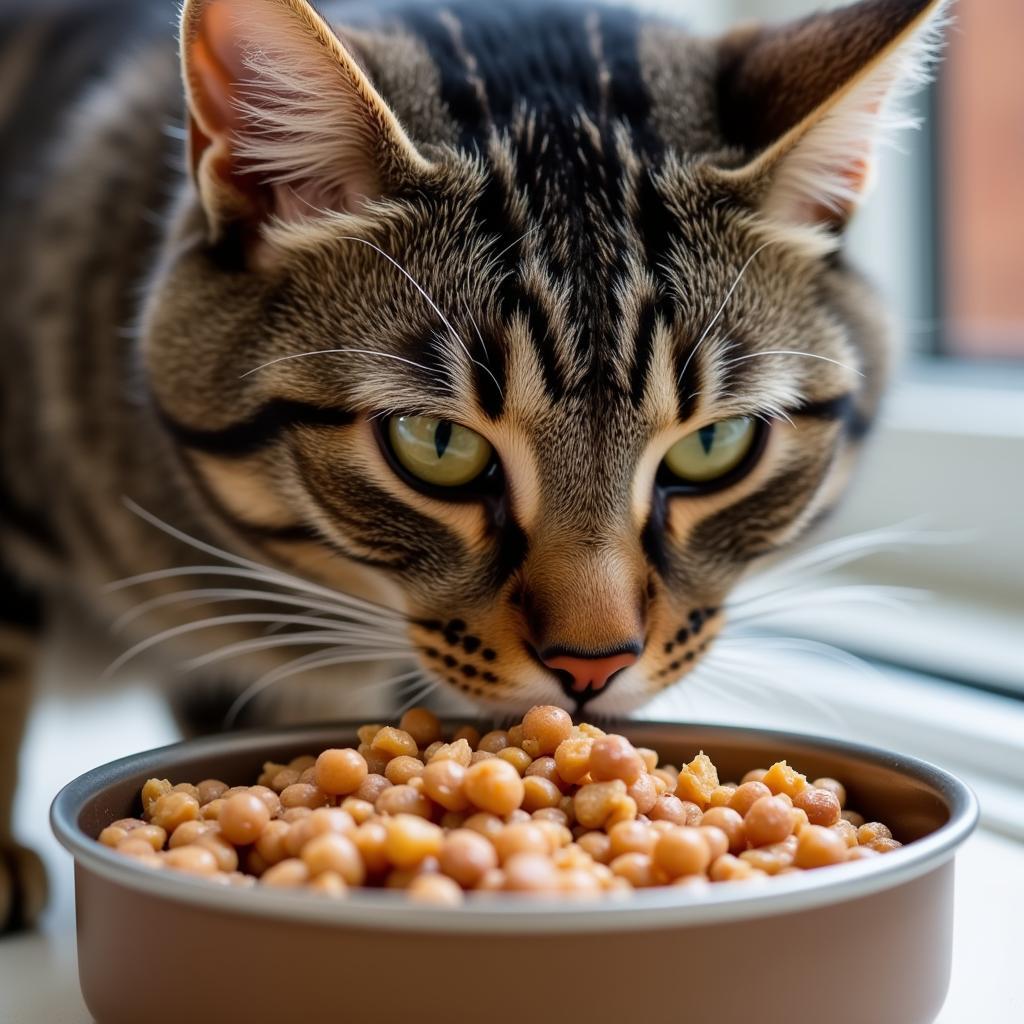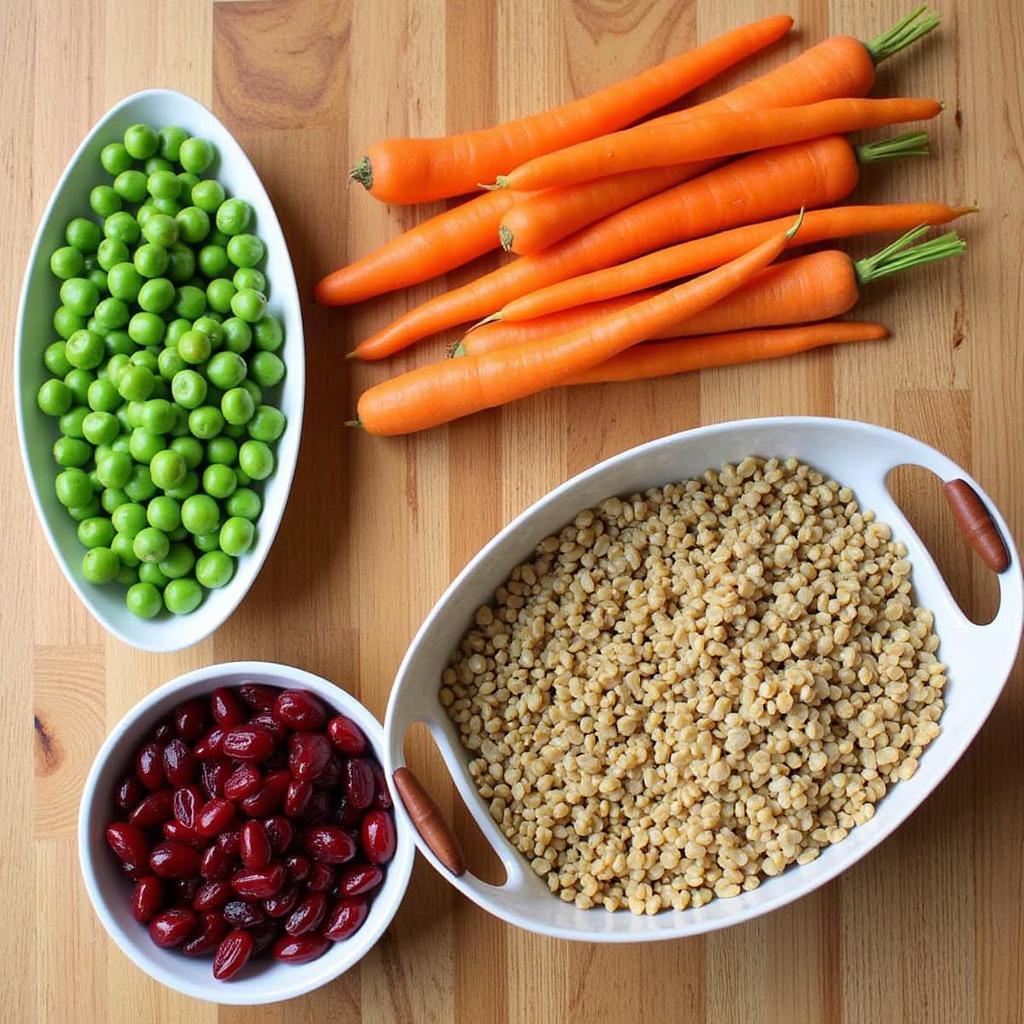Vegan Canned Cat Food is a growing trend among pet owners looking for ethical and sustainable options for their feline friends. But navigating this new world of plant-based pet food can be daunting. This guide will provide you with everything you need to know about choosing the best vegan canned cat food for your furry companion.  A variety of vegan cat food cans on a shelf.
A variety of vegan cat food cans on a shelf.
While a traditionally carnivorous diet might seem like the only option, advancements in pet nutrition have made complete and balanced vegan diets a possibility. But not all vegan cat foods are created equal. It’s crucial to understand the nutritional needs of cats and how a plant-based diet can fulfill those requirements.
Understanding Your Cat’s Nutritional Needs on a Vegan Diet
Cats are obligate carnivores, meaning their bodies are designed to thrive on animal-based proteins. Therefore, a vegan diet for cats must be carefully formulated to include all the essential nutrients they would typically get from meat. These include taurine, arginine, vitamin A, vitamin D3, and arachidonic acid. Look for vegan cat foods that are specifically formulated to meet AAFCO (Association of American Feed Control Officials) guidelines.
Key Nutrients to Look For in Vegan Canned Cat Food
- Taurine: This amino acid is critical for heart health, vision, and reproduction in cats.
- Arginine: Another essential amino acid that plays a role in various metabolic processes.
- Vitamin A: Important for vision, growth, and immune function. Look for preformed vitamin A (retinol) rather than plant-based beta-carotene, which cats cannot convert efficiently.
- Vitamin D3: Essential for calcium absorption and bone health.
- Arachidonic acid: An omega-6 fatty acid that cats need for skin and coat health.
 A cat enjoying a meal of vegan canned food.
A cat enjoying a meal of vegan canned food.
Selecting the Right Vegan Canned Cat Food
When choosing a vegan canned cat food, look for brands that conduct feeding trials and have their products analyzed by independent labs to verify nutritional adequacy. Reading reviews from other vegan cat owners can also provide valuable insights. Consider your cat’s individual preferences, such as flavor and texture. Some cats prefer pate, while others prefer chunks in gravy. If you have a cat that refuses to eat their meal, try mixing it with water to create a more appealing consistency. Remember, transitioning to a new diet should be gradual.
Transitioning Your Cat to Vegan Canned Cat Food
Start by mixing a small amount of the vegan food with your cat’s current food. Gradually increase the proportion of vegan food over several days or weeks, allowing your cat’s digestive system to adjust. Monitor your cat’s health closely during the transition and consult with your veterinarian if you notice any changes in their appetite, stool, or overall well-being. If your cat seems to be having digestive issues with their new diet, it could be a lifesaver food to transition back to their old diet.
Benefits of Vegan Canned Cat Food
Switching to vegan canned cat food can have several benefits for your cat and the environment. Plant-based diets are often lower in fat and calories, which can be beneficial for overweight cats. They may also be easier to digest for cats with sensitive stomachs. From an environmental perspective, vegan cat food production has a smaller carbon footprint than traditional meat-based pet foods. You may even consider purchasing food gift baskets for families who also have pets, so you can share your new favorite brand with them. Even if the baskets don’t include the exact food, you can still spread joy and support!
 Close-up of ingredients used in vegan cat food.
Close-up of ingredients used in vegan cat food.
Dr. Amelia Green, DVM, a leading expert in feline nutrition, states, “A well-formulated vegan diet can provide cats with all the nutrients they need to thrive.” Another expert, Dr. David Carter, PhD in Animal Nutrition, adds, “Vegan cat food can be a healthy and ethical choice for pet owners who are conscious of their environmental impact.” Rich fiber Indian food also highlights the benefits of plant-based diets.
Conclusion
Choosing the right vegan canned cat food requires careful consideration of your cat’s individual needs. By understanding the essential nutrients cats require and selecting a high-quality, AAFCO-approved vegan canned cat food, you can ensure your feline companion enjoys a healthy and happy life on a plant-based diet. Remember to consult your vet before making changes to your pet’s food. Emergency food patriot initiatives often focus on sustainable food sources, which aligns with the principles of veganism.
FAQ
- Is vegan cat food healthy? Yes, a well-formulated vegan cat food can be healthy and provide all the necessary nutrients.
- What are the key nutrients to look for? Taurine, arginine, vitamin A, vitamin D3, and arachidonic acid.
- How do I transition my cat to vegan food? Gradually mix the new food with their current food over several days or weeks.
- Where can I find high-quality vegan cat food? Look for brands that conduct feeding trials and have their products analyzed by independent labs.
- What are the benefits of vegan cat food? It can be lower in fat and calories, easier to digest, and more environmentally friendly.
- Can kittens eat vegan food? Consult your veterinarian about feeding kittens a vegan diet.
- What if my cat doesn’t like the vegan food? Try different brands and flavors, or mix the food with water. Wmergency food solutions sometimes explore plant-based alternatives.
For further support, please contact us at Phone Number: 02437655121, Email: minacones@gmail.com or visit us at 3PGH+8R9, ĐT70A, thôn Trung, Bắc Từ Liêm, Hà Nội, Việt Nam. We have a 24/7 customer support team. We also have articles on related topics such as rich fiber Indian food and lifesaver food, which might provide further insight into healthy food choices.